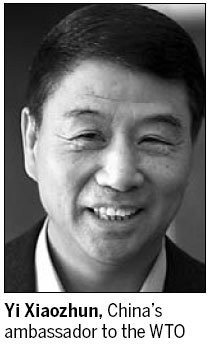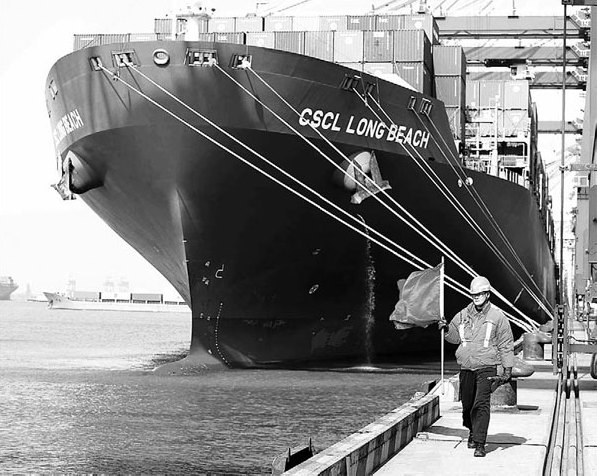Protectionism worries Chinese envoy
Updated: 2013-04-02 07:50
(China Daily)
|
||||||||
|
A worker in the Port of Qingdao in March. China's Ambassador to the WTO Yi Xiaozhun warned that the nation's exports situation this year is not positive and trade frictions targeting China will continue in the long term. Yu Fangping / For China Daily |
Trade | Ding Qingfen
Ambassador to WTO not optimistic about exports amid sluggish global economic recovery
He has kept a low profile, but as the Chinese ambassador to the World Trade Organization, nobody can ignore his job, especially given the slowdown of Chinese exports and the rising trade-remedy cases against China amid the eurozone debt crisis.
During an interview with China Daily, Yi Xiaozhun, also a former vice-minister of commerce, covered topics ranging from trade probes against Chinese products, China's export prospects and the future of made-in-China goods to China's role in the WTO. He also expressed his concern about the suspension of the Doha round of talks and the US-led Trans-Pacific Partnership Agreement, known as TPP.
Yi is not optimistic about China's exports and the increasing global trade protectionism against it, saying that his task will be "harder" and that China has to be "fully prepared".
Last year, Chinese exporters were hit with a series of trade probes and hefty duties launched by developed economies, including the United States and European Union member countries, mainly targeting the solar panel and telecom industries. The nation also missed its 10 percent target for foreign trade growth, amid lackluster global demand.
The ambassador is firm in his belief that all sides should advance the Doha round of talks to alleviate global trade frictions and to revive the global economy. He encouraged free trade agreements, but argued that multilateral trade pacts, or Doha, should be the mainstream under the WTO framework.
Q: As China's second ambassador to the WTO, what do you think of the change of China's role in the organization?
A: We feel that China is getting more respect and appreciation, and that our voice is being given more attention. But at the same time, I also feel the pressure to deliver, to create a favorable and fair environment for Chinese exporters.
Chinese exporters have been facing more trade barriers and investigations worldwide. Are increasing trade frictions a key source of the pressure?

Trade frictions targeting China have been, and will be, a situation that China has to face and deal with in the long term. And we've all noticed that global trade protectionism against China is getting worse: the value of the cases is increasing, and more cases are targeting China's high-end industries and high-tech sector. This makes the job more difficult. But this pain is part of China's growth. It's unavoidable and we must face it.
Many experts believe that China will have to face escalating trade frictions globally this year. Do you think so?
China's exports have been severely hit since the start of the global financial crisis. And as China's major trade partners, such as the United States, the European Union and Japan are facing economic problems, their trade protectionist measures against China will rise. We have to be clear about this. And we also have to be on high alert, because this will probably be a trend that will be seen in the coming years. We have to be fully prepared for that.
What would you like to do to help China and its exporters fend off the risks?
First, I think a major task would be to unswervingly push forward global free trade and the Doha round of trade talks. This is good for not only China, but also for the global multilateral trade system.
Second, I will try to let more people in the world know and recognize that China is open, transparent and free in its trade policy, so more people will come to support and accept China.
Do you believe that the world is becoming more rational and objective toward China and its trade policy?
Letting more people truly understand China will be a long-term process. Some developed economies are not comfortable about China's rapid rise in economic terms and they need time to accept China.
And amid such a severe economic situation, China should strive to stabilize exports and growth through further opening up, and the nation should also advance its steps to invest abroad.
How do you evaluate the nation's exports situation this year? How severely affected will it be?
I'm based in Europe, and I strongly feel that the region's consumption is shrinking. As China's largest trade partner, Europe reflects the general picture of China's exports. It's not positive, and that's it.
But Chinese manufacturers must try to maintain and even strengthen their competitiveness. They have to be fully prepared for climbing up the global value chain in the long term.
During the past few years, a number of Chinese manufacturers have pledged to upgrade their businesses and enhance their branding, research and design, and expand sales abroad. How do you evaluate their efforts, and can you feel any change of attitude in the global market toward the made-in-China products, which used to mean cheap prices and low quality?
We see made-in-China goods everywhere, and this fact itself shows that China is improving its manufacturing capacity and quality.
From my perspective, what we need to improve is brand building. But branding is a long-term and arduous task, and we are well under way.
Pascal Lamy will step down from the post of director-general of the WTO in August, and a batch of candidates are racing for the top job at the global trade arbitration organization. What are your comments?
Many believe the next head of the WTO should come from a developing economy, and China supports that view.
No matter who he or she is, we welcome a candidate who has strong skills, and who is in favor of free global trade and a multilateral trade mechanism, and who firmly advances the Doha round of talks.
The Doha round of talks reached a standstill. Is it possible to see a breakthrough this year for the talks?
China has been pushing forward the talks. But thanks to the global economic recovery and political reasons, some individuals and developed economies are following the wrong path and going against relevant WTO rules, including launching more trade-remedy cases worldwide.
As developing economies strengthen their capacities, we must join hands to complete the Doha round of talks, and we are determined and confident we can make it.
While the Doha round of talks stagnated, developed economies led by the US have been active in advancing bilateral trade pacts such as that with the EU and regional trade negotiations represented by the TPP. How would you comment on the trend? What's the way to balance multilateral and bilateral trade systems?
The Doha talks do not contradict bilateral trade talks and free trade agreements. We can strike a balance between them, as China did.
China signed FTAs with many nations including Chile and Peru, and is in negotiations with others like South Korea and Japan, but we highly advocate the Doha round of talks.
But our concern is that some countries, such as the US, are deviating from the multilateral system, shifting merely to the TPP and the trans-Atlantic free trade pact. This delays the Doha round of talks and hurts the multilateral trade mechanism.
Contact the writer at dingqingfen@chinadaily.com.cn
(China Daily 04/02/2013 page17)

 In Photos: 7.0-magnitude quake hits Sichuan
In Photos: 7.0-magnitude quake hits Sichuan
 Li Na on Time cover, makes influential 100 list
Li Na on Time cover, makes influential 100 list
 FBI releases photos of 2 Boston bombings suspects
FBI releases photos of 2 Boston bombings suspects
 World's wackiest hairstyles
World's wackiest hairstyles
 Sandstorms strike Northwest China
Sandstorms strike Northwest China
 Never-seen photos of Madonna on display
Never-seen photos of Madonna on display
 H7N9 outbreak linked to waterfowl migration
H7N9 outbreak linked to waterfowl migration
 Dozens feared dead in Texas plant blast
Dozens feared dead in Texas plant blast
Most Viewed
Editor's Picks

|

|

|

|

|

|
Today's Top News
Live report: 7.0-magnitude quake hits Sichuan, heavy casualties feared
Boston suspect cornered on boat
Cross-talk artist helps to spread the word
'Green' awareness levels drop in Beijing
Palace Museum spruces up
First couple on Time's list of most influential
H7N9 flu transmission studied
Trading channels 'need to broaden'
US Weekly

|

|








